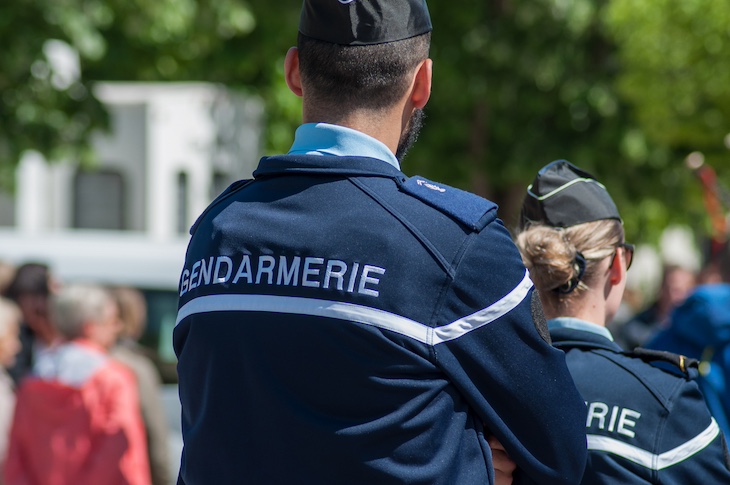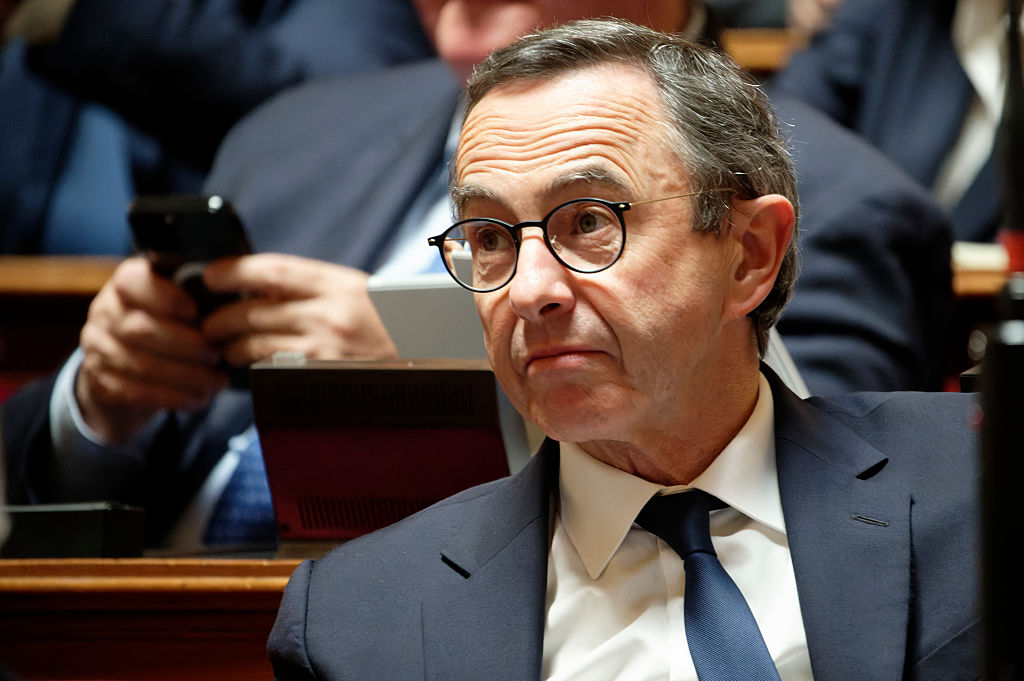A gendarme was killed in France on Monday evening when a driver ran him over at a routine roadside checkpoint in Provence.
The driver of the BMW was an intoxicated 39-year-old from Cape Verde who during his time in France has racked up a lengthy criminal record including ten convictions, two for drunk driving.
On Wednesday the wife of 54-year-old Éric Comyn paid tribute to him at a service attended by local dignitaries and members of the gendarmerie. She described a devoted father of two teenage children, who was soon to retire after 30 years’ service.
Madame Comyn is the latest in a growing list of grieving relatives in France who refuse to go quietly into the night
Madame Comyn’s tone then changed from grief to anger. ‘I say it loud and clear: France killed my husband because of its inadequacy, its laxity and its excessive tolerance.’
She pointed to the driver’s previous convictions and expressed her disbelief that he had never been imprisoned. ‘When will our legislators really open their eyes?’ she demanded to know. ‘How many people will die before these killers are truly punished?’
With cold, controlled rage, the gendarme’s widow forecast what would now happen to the arrested man: ‘Immediate committal for trial, three hot meals, welfare benefits.’ She and her children, on the other hand, have been handed a life sentence of sorrow.
Madame Comyn is the latest in a growing list of grieving relatives in France who refuse to go quietly into the night, fobbed off by political platitudes and often a posthumous Légion d’honneur.
The mother of Lieutenant-Colonel Arnaud Beltrame, a gendarme murdered by an Islamist terrorist during a supermarket siege in 2018, told a Paris court earlier this year that her son had fought to the death. ‘Finally someone who isn’t a coward,’ she told the judge. ‘There’s enough of this cowardice, this laxity. It’s time to wake up.’
The sister of Samuel Paty, the schoolteacher murdered by an Islamist in 2020, last year accused the state of incompetence and cowardice in abandoning her brother before and after his death. ‘We can see pacifists, utopians of reconciliation, supporting terrorists by invoking the duty to forget,’ said Mickaëlle Paty. She also pointed a finger at the mainstream media. ‘The same media-political scenario is played out after every attack, when such an event is passed off as an inevitability that no one could have foreseen, and so no one is considered to have failed.’
Other have also spoken out. The wife of a bus driver beaten to death in his vehicle in 2020 by three thugs in Bayonne; Claire, a young Parisian raped by an illegal immigrant last year; and the family of Thomas, a 16-year-old fatally stabbed last November at a village dance by a gang who had gate-crashed the event allegedly with the intention of ‘killing a white’.
‘These savages must be removed from our society very quickly,’ Thomas’s grandfather told mourners at his funeral.
Such visceral reactions make the media and political elite uncomfortable. They preferred the meek passivity of a decade ago when Islamists began slaughtering the French in their scores.
Back then flowers were laid at the scene of each atrocity, along with scented candles and soft toys.
There was also often music. Imagine was a particularly favourite. After two Islamists had shot dead the staff of Charlie Hebdo in January 2015, a German called Davide Martello turned up in the French capital with a piano to play the John Lennon song. He was back the following November, tinkling the ivories after an Isis terror cell had massacred 130 Parisians.
Martello no longer turns up at tragedies, and there are no longer books published by relatives of victims entitled, You Will Not Have My Hate, as there was after the Bataclan attack.
Hate now abounds, not just in France, but across Europe. It is directed at the perpetrators as well as the politicians who continue to ignore their electorates’ anxiety about mass immigration and the insecurity it often brings with it.
What distinguishes France from its neighbours is that this discontent has spread to the police and gendarmerie.
Many rank-and-file police officers have lost faith in the judiciary and politicians. They despair at the soft sentencing, symptomatic of a naive mindset that cannot grasp the extent to which France is becoming, according to Emmanuel Macron, ‘de-civilised’.
The death of Éric Comyn bore a striking similarity to that of Mélanie Lemée, a gendarme who was run down by Yassine El Azizi in 2020. He was speeding, under the influence of drugs and driving without a licence. He is back on the streets, released last year to the fury of the gendarmerie and Mélanie’s parents, who called the decision to free him ‘scandalous and unacceptable’.
Now another family is mourning a gendarme, a man who was killed, in the words of his widow, by the weakness of his own country.








Comments